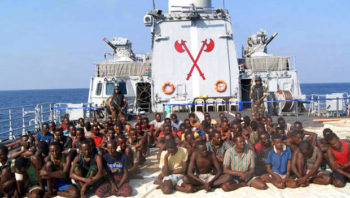
Source: Middle East Monitor
The last batch of 120 Somalis touched down at Mogadishu’s international airport Monday after serving up to seven years in jail for piracy offenses, Garowe Online reported.
Seventy-five Somali men received a warm welcome from Mahdi Mohamed Guled Khadar, deputy prime minister, and other government officials. All the men kneeled to kiss Somali soil as they got off the plane, the site reported. India’s navy captured the men off Somalia’s coast and they were charged with piracy.
In early January this year, Somalia received the first batch of 41 returnees, some of them having completed their jail terms. Two Somali prisoners died in Indian custody since being captured seven years ago. The men died from diseases including tuberculosis due to the lack of heath care, according to Garowe Online.
The incident comes off the back of an agreement signed in August last year between India and Somalia to transfer convicted pirates.
Fifteen Somali pirates hijacked a commercial oil tanker belonging to the United Arab Emirates (UAE) last year, in the first successful hijack since 2012.
The European Union arrested six pirates off Somalia’s coast in November last year. The operation took over 24 hours, after the Somali men attacked a 52,000-tonne container ship and a fishing vessel.
Piracy is a global threat to the international shipping industry and poses a severe security risk to trade companies operating past the Somali waters and on to the Indian Ocean. Acts of piracy off the Somali coast rose after 2005, costing shipping companies billions of dollars, but have declined in recent years due to beefed-up naval patrols and greater security aboard merchant ships. Since Somalia’s spike in piracy in 2011 which saw some 736 hostages and 32 ships hijacked, fewer attacks have been reported.
India has previously provided Somalia with development support, including transport infrastructure.